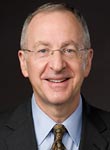Cornell launches $100 million fund to recruit faculty
By Susan Kelley

Cornell faces an unprecedented number of faculty retirements over the next decade. The university sees that challenge as an unprecedented opportunity: the chance to recruit outstanding new faculty - the next generation's Alison Luries, Carl Sagans and Barbara McClintocks.
A $100 million Cornell Faculty Renewal Fund will leverage that opportunity, enabling the university to significantly accelerate hiring of faculty over the next five years, funded through philanthropy and university dollars. "Hiring new faculty is a clear sign that we are emerging healthier and better positioned for the future," President David Skorton recently wrote in an e-mail to the campus community. "This will allow us to build strength in strategically important areas and shape Cornell for a generation or more."
A $5 million gift from David Croll '70, chair of the Cornell Board of Trustees' Finance Committee, has kicked off the initiative, which will pay for such incentives as salary, startup funds for laboratories, library acquisitions and research stipends.
"We want to be leaders, not just competitive, in what we provide for faculty to come to Cornell," said Provost Kent Fuchs. Two factors catalyzed the initiative, he added.
First, Cornell's Strategic Plan makes faculty excellence a top priority. In part that's because a significant proportion of current professors are likely to retire in the next 10 years. In 2008-09, nearly half of the faculty was 55 or older and nearly one-third was 60 or older.
Other universities are facing the same situation -- and will be vying for replacements. "You don't want to hire in the middle of that storm," said Croll, a managing general partner at M/C Ventures. "You want to get great people here, putting down roots and then let the hiring tsunami begin. If we can make that a priority, then Cornell will do extremely well."
Second are market conditions. The national financial downturn in 2008-09 slowed the ability of many universities -- including Cornell -- to hire. Now an abundance of exceptional academics are hunting for jobs, said Dean of Faculty William Fry. "There is a really excellent pool from which to select. ... It's a buyer's market."
G. Peter Lepage, the Harold Tanner Dean of the College of Arts and Sciences, said an aggressive program of hiring over the next few years will give Cornell a long-lasting advantage. "The excellent faculty we hire now, at various stages in their careers, will do more than any other single factor to define our institution for the next few decades."
The goal is to hire new faculty three to four years before a senior professor retires. That will enable Cornell to take advantage of market conditions. And it will give younger faculty time to assume senior roles and gain visibility in their disciplines.
The fund will apply to all colleges and schools, and Fuchs has asked deans to make faculty hiring their first priority and to prioritize the areas in which they will recruit, he said. Donors may designate faculty renewal gifts to a specific college or school or to be used at the discretion of the provost.
A $50 million Faculty Renewal Sesquicentennial Challenge will match multiyear gift commitments of $500,000 or more from donors on a dollar-for-dollar basis with university funds.
Get Cornell news delivered right to your inbox.
Subscribe